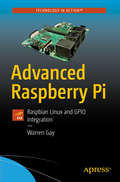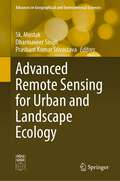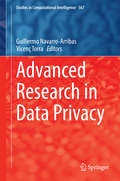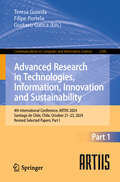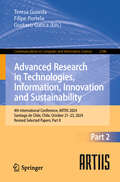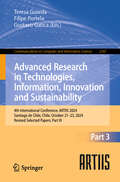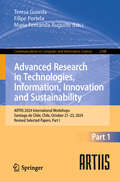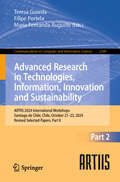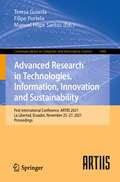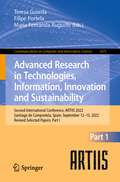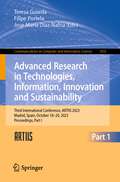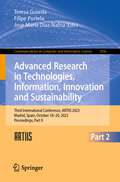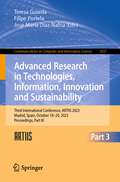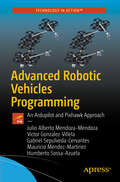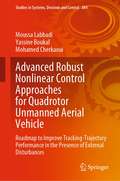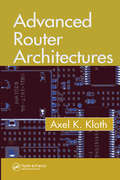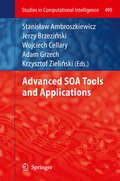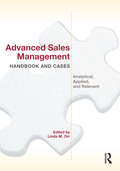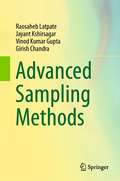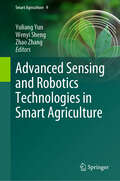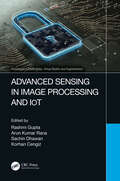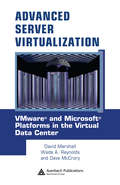- Table View
- List View
Advanced Raspberry Pi: Raspbian Linux And Gpio Integration
by Warren GayJump right into the pro-level guts of the Raspberry Pi with complete schematics and detailed hardware explanations as your guide. You'll tinker with runlevels, reporting voltages and temperatures, and work on a variety of project examples that you can tune for your own project ideas.. This book is fully updated for the latest Pi boards with three chapters dedicated to GPIO to help you master key aspects of the Raspberry Pi. You'll work with Linux driver information and explore the different Raspberry Pi models, including the Pi Zero, Pi Zero W, Pi 2, Pi3 B and Pi3 B+. You'll also review a variety of project examples that you can tune for your own project ideas. Other topics covered include the 1-Wire driver interface, how to configure a serial Linux console, and cross-compile code, including the Linux kernel. You'll find yourself turning to Advanced Raspberry Pi over and over again for both inspiration and reference. Whether you're an electronics professional, an entrepreneurial maker, or just looking for more detailed information on the Raspberry Pi, this is exactly the book for you.What You'll LearnMaster I2C and SPI communications from Raspbian Linux in CProgram USB peripherals, such as a 5-inch LCD panel with touch control and the Pi cameraStudy GPIO hardware, the sysfs driver interface and direct access from C programsUse and program the UART serial device. Who This Book Is ForAdvanced Raspberry Pi users who have experience doing basic projects and want to take their projects further.
Advanced Remote Sensing for Urban and Landscape Ecology (Advances in Geographical and Environmental Sciences)
by Dharmaveer Singh Sk. Mustak Prashant Kumar SrivastavaThis book introduces the use of various remote sensing data such as microwave, hyperspectral and very high-resolution (VHR) satellite imagery; mapping techniques including pixel and object-based machine learning; and geostatistical modelling techniques including cellular automation, entropy and land fragmentation. Remote sensing plays a vital role in solving urban and environmental challenges at the landscape level. Globally, more than half of the urban population is facing severe environmental and social challenges, especially those relating to climate change, agricultural land encroachment, green infrastructure and environmental degradation, mobility due to rapid rural–urban transformation and anthropogenic interventions. Mapping and quantification of such threats at the landscape level are challenging for experts using traditional techniques; however, remote sensing technology provides diverse spatial data at a varying scale, volume and accessibility for mapping and modelling, and it also analyses challenges at urban and landscape levels. Together, they address challenges at urban and landscape levels to support the Sustainable Development Goals (SDGs).
Advanced Research in Data Privacy (Studies in Computational Intelligence #567)
by Guillermo Navarro-Arribas Vicenç TorraThis book provides an overview of the research work on data privacy and privacy enhancing technologies carried by the participants of the ARES project. ARES (Advanced Research in Privacy an Security, CSD2007-00004) has been one of the most important research projects funded by the Spanish Government in the fields of computer security and privacy. It is part of the now extinct CONSOLIDER INGENIO 2010 program, a highly competitive program which aimed to advance knowledge and open new research lines among top Spanish research groups. The project started in 2007 and will finish this 2014. Composed by 6 research groups from 6 different institutions, it has gathered an important number of researchers during its lifetime. Among the work produced by the ARES project, one specific work package has been related to privacy. This books gathers works produced by members of the project related to data privacy and privacy enhancing technologies. The presented works not only summarize important research carried in the project but also serve as an overview of the state of the art in current research on data privacy and privacy enhancing technologies.
Advanced Research in Technologies, Information, Innovation and Sustainability: 4th International Conference, ARTIIS 2024, Santiago de Chile, Chile, October 21–23, 2024, Revised Selected Papers, Part I (Communications in Computer and Information Science #2345)
by Teresa Guarda Filipe Portela Gustavo GaticaThis three-volume set, CCIS 2345-2347, constitutes the revised selected papers from the 4th International Conference on Advanced Research in Technologies, Information, Innovation and Sustainability 2024, ARTIIS 2024, held in Santiago de Chile, Chile, during October 21-23, 2024. The 83 full papers and 8 short papers included in these proceedings were carefully reviewed and selected from 238 submissions. These papers are categorized under the following topical sections:- Part I: Computing Solutions Part II: Data Intelligence Part III: Sustainability; Ethics, Security, and Privacy
Advanced Research in Technologies, Information, Innovation and Sustainability: 4th International Conference, ARTIIS 2024, Santiago de Chile, Chile, October 21–23, 2024, Revised Selected Papers, Part II (Communications in Computer and Information Science #2346)
by Teresa Guarda Filipe Portela Gustavo GaticaThis three-volume set, CCIS 2345-2347, constitutes the revised selected papers from the 4th International Conference on Advanced Research in Technologies, Information, Innovation and Sustainability 2024, ARTIIS 2024, held in Santiago de Chile, Chile, during October 21-23, 2024. The 83 full papers and 8 short papers included in these proceedings were carefully reviewed and selected from 238 submissions. These papers are categorized under the following topical sections:- Part I: Computing Solutions Part II: Data Intelligence Part III: Sustainability; Ethics, Security, and Privacy
Advanced Research in Technologies, Information, Innovation and Sustainability: 4th International Conference, ARTIIS 2024, Santiago de Chile, Chile, October 21–23, 2024, Revised Selected Papers, Part III (Communications in Computer and Information Science #2347)
by Teresa Guarda Filipe Portela Gustavo GaticaThis three-volume set, CCIS 2345-2347, constitutes the revised selected papers from the 4th International Conference on Advanced Research in Technologies, Information, Innovation and Sustainability 2024, ARTIIS 2024, held in Santiago de Chile, Chile, during October 21-23, 2024. The 83 full papers and 8 short papers included in these proceedings were carefully reviewed and selected from 238 submissions. These papers are categorized under the following topical sections:- Part I: Computing Solutions Part II: Data Intelligence Part III: Sustainability; Ethics, Security, and Privacy
Advanced Research in Technologies, Information, Innovation and Sustainability: ARTIIS 2024 International Workshops, Santiago de Chile, Chile, October 21–23, 2024, Revised Selected Papers, Part I (Communications in Computer and Information Science #2348)
by Teresa Guarda Filipe Portela Maria Fernanda AugustoThis two-volume set, CCIS 2348 and CCIS 2349 ,constitutes the revised selected papers from the International Conference on Advanced Research in Technologies, Information, Innovation and Sustainability 2024, ARTIIS 2024 Workshops, held in Santiago de Chile, Chile, in October 2024. The 55 full papers and 10 short papers presented in these two volumes were carefully reviewed and selected from 170 submissions. These proceedings include papers from the following workshops: Part I: Applications of Computational Mathematics to Simulation and Data Analysis (ACMaSDA 2024); Business, Technology and Digital Transformation (BTDT 2024); Intelligent Systems for Health and Medical Care (ISHMC 2024); Workshop on Gamification Application and Technologies (GAT 2024); Smart Tourism and Information Systems (SMARTTIS 2024). Part II: International Symposium on Technological Innovations for Industry and Society (ISTIIS 2024); International Workshop on Electronic and Telecommunications (IWET 2024); Boosting Tourism using New Technologies (#RTNT2024); Cybersecurity in Information and Communication Technologies (CICT 2024); Bridging Knowledge in a Fragmented World (glossaLAB 2024); Workshop on IoT Networks and Wireless for sustainability (WINWIN-4S 2024); Innovation in Educational Technology (JIUTE 2024).
Advanced Research in Technologies, Information, Innovation and Sustainability: ARTIIS 2024 International Workshops, Santiago de Chile, Chile, October 21–23, 2024, Revised Selected Papers, Part II (Communications in Computer and Information Science #2349)
by Teresa Guarda Filipe Portela Maria Fernanda AugustoThis two-volume set, CCIS 2348 and CCIS 2349 ,constitutes the revised selected papers from the International Conference on Advanced Research in Technologies, Information, Innovation and Sustainability 2024, ARTIIS 2024 Workshops, held in Santiago de Chile, Chile, in October 2024. The 55 full papers and 10 short papers presented in these two volumes were carefully reviewed and selected from 170 submissions. These proceedings include papers from the following workshops: Part I: Applications of Computational Mathematics to Simulation and Data Analysis (ACMaSDA 2024); Business, Technology and Digital Transformation (BTDT 2024); Intelligent Systems for Health and Medical Care (ISHMC 2024); Workshop on Gamification Application and Technologies (GAT 2024); Smart Tourism and Information Systems (SMARTTIS 2024). Part II: International Symposium on Technological Innovations for Industry and Society (ISTIIS 2024); International Workshop on Electronic and Telecommunications (IWET 2024); Boosting Tourism using New Technologies (#RTNT2024); Cybersecurity in Information and Communication Technologies (CICT 2024); Bridging Knowledge in a Fragmented World (glossaLAB 2024); Workshop on IoT Networks and Wireless for sustainability (WINWIN-4S 2024); Innovation in Educational Technology (JIUTE 2024).
Advanced Research in Technologies, Information, Innovation and Sustainability: First International Conference, ARTIIS 2021, La Libertad, Ecuador, November 25–27, 2021, Proceedings (Communications in Computer and Information Science #1485)
by Teresa Guarda Filipe Portela Manuel Filipe SantosThis book constitutes the refereed proceedings of the First International Conference on Advanced Research in Technologies, Information, Innovation and Sustainability, ARTIIS 2021, held in La Libertad, Ecuador, in November 2021. The 53 full papers and 2 short contributions were carefully reviewed and selected from 155 submissions. The volume covers a variety of topics, such as computer systems organization, software engineering, information storage and retrieval, computing methodologies, artificial intelligence, and others. The papers are logically organized in the following thematic blocks: Computing Solutions; Data Intelligence; Ethics, Security, and Privacy; Sustainability.
Advanced Research in Technologies, Information, Innovation and Sustainability: Second International Conference, ARTIIS 2022, Santiago de Compostela, Spain, September 12–15, 2022, Revised Selected Papers, Part I (Communications in Computer and Information Science #1675)
by Teresa Guarda Filipe Portela Maria Fernanda AugustoThe two-volume Proceedings set CCIS 1675 and 1676 constitutes the refereed proceedings of the Second International Conference, ARTIIS 2022, held in Santiago de Compostela, Spain, during September 12–15, 2022. The 72 papers included in these proceedings were carefully reviewed and selected from 191 submissions. These papers were categorized into 2 technical tracks, i.e., Computing Solutions and Data Intelligence.
Advanced Research in Technologies, Information, Innovation and Sustainability: Second International Conference, ARTIIS 2022, Santiago de Compostela, Spain, September 12–15, 2022, Revised Selected Papers, Part II (Communications in Computer and Information Science #1676)
by Teresa Guarda Filipe Portela Maria Fernanda AugustoThe two-volume Proceedings set CCIS 1675 and 1676 constitutes the refereed proceedings of the Second International Conference, ARTIIS 2022, held in Santiago de Compostela, Spain, during September 12–15, 2022. The 72 papers included in these proceedings were carefully reviewed and selected from 191 submissions. These papers were categorized into 2 technical tracks, i.e., Sustainability and Ethics, Security, and Privacy.
Advanced Research in Technologies, Information, Innovation and Sustainability: Third International Conference, ARTIIS 2023, Madrid, Spain, October 18–20, 2023, Proceedings, Part I (Communications in Computer and Information Science #1935)
by Teresa Guarda Jose Maria Diaz-Nafria Filipe PortelaThe three-volume set CCIS 1935, 1936 and 1937 constitutes the refereed post-conference proceedings of the Third International Conference, ARTIIS 2023, Madrid, Spain, October 18–20, 2023, Proceedings. The 98 revised full papers presented in these proceedings were carefully reviewed and selected from 297 submissions. The papers are organized in the following topical sections:Part I:Computing Solutions, Data IntelligencePart II:Sustainability, Ethics, Security, and Privacy Part III:Applications of Computational Mathematics to Simulation and Data Analysis (ACMaSDA 2023), Challenges and the Impact of Communication and Information Technologies on Education (CICITE 2023), Workshop on Gamification Application and Technologies (GAT 2023), Bridging Knowledge in a Fragmented World (glossaLAB 2023), Intelligent Systems for Health and Medical Care (ISHMC 2023), Intelligent Systems for Health and Medical Care (ISHMC 2023), Intelligent Systems in Forensic Engineering (ISIFE 2023), International Symposium on Technological Innovations for Industry and Soci-ety (ISTIIS 2023), International Workshop on Electronic and Telecommunications (IWET 2023), Innovation in Educational Technology (JIUTE 2023), Smart Tourism and Information Systems (SMARTTIS 2023).
Advanced Research in Technologies, Information, Innovation and Sustainability: Third International Conference, ARTIIS 2023, Madrid, Spain, October 18–20, 2023, Proceedings, Part II (Communications in Computer and Information Science #1936)
by Teresa Guarda Jose Maria Diaz-Nafria Filipe PortelaThe three-volume set CCIS 1935, 1936 and 1937 constitutes the refereed post-conference proceedings of the Third International Conference, ARTIIS 2023, Madrid, Spain, October 18–20, 2023, Proceedings. The 98 revised full papers presented in these proceedings were carefully reviewed and selected from 297 submissions. The papers are organized in the following topical sections:Part I:Computing Solutions, Data IntelligencePart II:Sustainability, Ethics, Security, and Privacy Part III:Applications of Computational Mathematics to Simulation and Data Analysis (ACMaSDA 2023), Challenges and the Impact of Communication and Information Technologies on Education (CICITE 2023), Workshop on Gamification Application and Technologies (GAT 2023), Bridging Knowledge in a Fragmented World (glossaLAB 2023), Intelligent Systems for Health and Medical Care (ISHMC 2023), Intelligent Systems for Health and Medical Care (ISHMC 2023), Intelligent Systems in Forensic Engineering (ISIFE 2023), International Symposium on Technological Innovations for Industry and Soci-ety (ISTIIS 2023), International Workshop on Electronic and Telecommunications (IWET 2023), Innovation in Educational Technology (JIUTE 2023), Smart Tourism and Information Systems (SMARTTIS 2023).
Advanced Research in Technologies, Information, Innovation and Sustainability: Third International Conference, ARTIIS 2023, Madrid, Spain, October 18–20, 2023, Proceedings, Part III (Communications in Computer and Information Science #1937)
by Teresa Guarda Jose Maria Diaz-Nafria Filipe PortelaThe three-volume set CCIS 1935, 1936 and 1937 constitutes the refereed post-conference proceedings of the Third International Conference, ARTIIS 2023, Madrid, Spain, October 18–20, 2023, Proceedings. The 98 revised full papers presented in these proceedings were carefully reviewed and selected from 297 submissions. The papers are organized in the following topical sections:Part I:Computing Solutions, Data IntelligencePart II:Sustainability, Ethics, Security, and Privacy Part III:Applications of Computational Mathematics to Simulation and Data Analysis (ACMaSDA 2023), Challenges and the Impact of Communication and Information Technologies on Education (CICITE 2023), Workshop on Gamification Application and Technologies (GAT 2023), Bridging Knowledge in a Fragmented World (glossaLAB 2023), Intelligent Systems for Health and Medical Care (ISHMC 2023), Intelligent Systems for Health and Medical Care (ISHMC 2023), Intelligent Systems in Forensic Engineering (ISIFE 2023), International Symposium on Technological Innovations for Industry and Soci-ety (ISTIIS 2023), International Workshop on Electronic and Telecommunications (IWET 2023), Innovation in Educational Technology (JIUTE 2023), Smart Tourism and Information Systems (SMARTTIS 2023).
Advanced Robotic Vehicles Programming: An Ardupilot and Pixhawk Approach
by Gabriel Sepulveda-Cervantes Mauricio Mendez-Martinez Humberto Sossa-Azuela Julio Alberto Mendoza-Mendoza Victor Javier Gonzalez-VillelaLearn how to program robotic vehicles with ardupilot libraries and pixhawk autopilot, both of which are open source technologies with a global scope. This book is focused on quadcopters but the knowledge is easily extendable to three-dimensional vehicles such as drones, submarines, and rovers.Pixhawk and the ardupilot libraries have grown dramatically in popularity due to the fact that the hardware and software offer a real-time task scheduler, huge data processing capabilities, interconnectivity, low power consumption, and a global developer support. This book shows you how take your robotic programming skills to the next level. From hardware to software, Advanced Robotic Vehicles Programming links theory with practice in the development of unmanned vehicles. By the end of this book, you’ll learn the pixhawk software and ardupilot libraries to develop your own autonomous vehicles. What You'll Learn Model and implement elementary controls in any unmanned vehicle Select hardware and software components during the design process of an unmanned vehicle Use other compatible hardware and software development packages Understand popular scientific and technical nomenclature in the field Identify relevant complexities and processes for the operation of an unmanned vehicle Who This Book Is For Undergraduate and graduate students, researchers, makers, hobbyists, and those who want to go beyond basic programming of an Arduino for any kind of robotic vehicle.
Advanced Robust Nonlinear Control Approaches for Quadrotor Unmanned Aerial Vehicle: Roadmap to Improve Tracking-Trajectory Performance in the Presence of External Disturbances (Studies in Systems, Decision and Control #384)
by Moussa Labbadi Yassine Boukal Mohamed CherkaouiThis book studies selected advanced flight control schemes for an uncertain quadrotor unmanned aerial vehicle (UAV) systems in the presence of constant external disturbances, parametric uncertainties, measurement noise, time-varying external disturbances, and random external disturbances. Furthermore, in all the control techniques proposed in this book, it includes the simulation results with comparison to other nonlinear control schemes recently developed for the tracking control of a quadrotor UAV. The main contributions of the present book for quadrotor UAV systems are as follows:(i) the proposed control methods are based on the high-order sliding mode controller (SMC) and hybrid control algorithm with an optimization method.(ii) the finite-time control schemes are developed by using fast terminal SMC (FTSMC), nonsingular FTSMC (NFTSMC), global time-varying SMC, and adaptive laws. (iii) the fractional-order flight control schemes are developed by using the fractional-order calculus theory, super twisting algorithm, NFTSMC, and the SMC.This book covers the research history and importance of quadrotor system subject to system uncertainties, external wind disturbances, and noise measurements, as well as the research status of advanced flight control methods, adaptive flight control methods, and flight control based on fractional-order theory. The book would be interesting to most academic undergraduate, postgraduates, researchers on flight control for drones and applications of advanced controllers in engineering field. This book presents a must-survey for advanced finite-time control for quadrotor system. Some parts of this book have the potential of becoming the courses for the modelling and control of autonomous flying machines. Readers (academic researcher, undergraduate student, postgraduate student, MBA/executive, and education practitioner) interested in nonlinear control methods find this book an investigation. This book can be used as a good reference for the academic research on the control theory, drones, terminal sliding mode control, and related to this or used in Ph.D. study of control theory and their application in field engineering.
Advanced Router Architectures
by Axel K. KlothRouters, switches, and transmission equipment form the backbone of the Internet, yet many users and service technicians do not understand how these nodes really work.Advanced Router Architectures addresses how components of advanced routers work together and how they are integrated with each other. This book provides the background behind why these building blocks perform certain functions, and how the function is implemented in general use. It offers an introduction to the subject matter that is intended to trigger deeper interest from the reader. The book explains, for example, why traffic management may be important in certain applications, what the traffic manager does, and how it connects to the rest of the router. The author also examines the implications of the introduction or omission of a traffic manager into an advanced router. The text offers a similar analysis for other router topics such as QOS and policy enforcement, security processing (including DoS/DDoS), and more.This book covers which mandatory and which optional building blocks can be found in an advanced router, and how these building blocks operate in conjunction to ensure that the Internet performs as expected.
Advanced SOA Tools and Applications (Studies in Computational Intelligence #499)
by Wojciech Cellary Adam Grzech Stanisław Ambroszkiewicz Jerzy Brzeziński Krzysztof ZielińskiThis book presents advanced software development tools for construction, deployment and governance of Service Oriented Architecture (SOA) applications. Novel technical concepts and paradigms, formulated during the research stage and during development of such tools are presented and illustrated by practical usage examples. Hence this book will be of interest not only to theoreticians but also to engineers who cope with real-life problems. Additionally, each chapter contains an overview of related work, enabling comparison of the proposed concepts with exiting solutions in various areas of the SOA development process. This makes the book interesting also for students and scientists who investigate similar issues.
Advanced Sales Management Handbook and Cases: Analytical, Applied, and Relevant
by Linda M OrrAdvanced Sales Management Handbook and Cases: Analytical, Applied, and Relevant will fill the need in the market for a solid case work, role play, and activity book. It has been written by sales teaching professionals and sales executives. The life experiences of professionals with varied experiences will provide students with a solid foundation for learning. This will give college professors from around the world a better opportunity to ensure quality of learning. The book is intended to be supplemental to any other sales management text on the market, but could be used alone in an advanced sales management or marketing analytics course in which the students already have the base theoretical knowledge. The various cases, role plays, and experiential exercises in this book will follow the same topical structure of other sales management texts so that any sales management instructor can readily adopt this supplemental book. For many of the cases, actual data has been given so that students are required to use and understand analytical software.
Advanced Sampling Methods
by Girish Chandra Raosaheb Latpate Jayant Kshirsagar Vinod Kumar GuptaThis book discusses all major topics on survey sampling and estimation. It covers traditional as well as advanced sampling methods related to the spatial populations. The book presents real-world applications of major sampling methods and illustrates them with the R software. As a large sample size is not cost-efficient, this book introduces a new method by using the domain knowledge of the negative correlation between the variable of interest and the auxiliary variable in order to control the size of a sample. In addition, the book focuses on adaptive cluster sampling, rank-set sampling and their applications in real life. Advance methods discussed in the book have tremendous applications in ecology, environmental science, health science, forestry, bio-sciences, and humanities. This book is targeted as a text for undergraduate and graduate students of statistics, as well as researchers in various disciplines.
Advanced Sensing and Robotics Technologies in Smart Agriculture (Smart Agriculture #9)
by Zhao Zhang Wenyi Sheng Yuliang YunThis book specifically focuses on state-of-the-art advanced sensing and robotic techniques in smart agriculture and comprehensively describes the new knowledge. Significant agricultural technology progress in advanced sensing and robotics technology has been made recently, which has transformed the conventional agriculture to smart and digital agriculture It provides readers take-away knowledge for seed quality detection, specialty crop harvest and sorting robotics, new sensing method for crop nutrient status, and broadband soil dielectric permittivity measurements. All these new technologies have been developed, tested, or practically applied. It is a useful reference for readers in the field of smart agriculture and agriculture robotics.
Advanced Sensing in Image Processing and IoT (Innovations in Multimedia, Virtual Reality and Augmentation)
by Rashmi Gupta, Arun Kumar Rana, Sachin Dhawan, and Korhan CengizThe book provides future research directions in IoT and image processing based Energy, Industry, and Healthcare domain and explores the different applications of its associated technologies. However, the Internet of Things and image processing is a very big field with a lot of subfields, which are very important such as Smart Homes to improve our daily life, Smart Cities to improve the citizens' life, Smart Towns to recover the livability and traditions, Smart Earth to protect our world, and Industrial Internet of Things to create safer and easier jobs. This book considers very important research areas in Energy, Industry, and Healthcare domain with IoT and image processing applications.The aim of the book to highlights future directions of optimization methods in various engineering and science applications in various IoT and image processing applications. Emphasis is given to deep learning and similar models of neural network-based learning techniques employed in solving optimization problems of different engineering and science applications. The role of AI in mechatronics is also highlighted using suitable optimization methods. This book considers very important research areas in Energy, Industry, and Healthcare. It addresses major issues and challenges in Energy, Industry, and Healthcare and solutions proposed for IoT-enabled cellular/computer networks, routing/communication protocols, surveillances applications, secured data management, and positioning approaches. It focuses mainly on smart and context-aware implementations. Key sailing Features: The impact of the proposed book is to provide a major area of concern to develop a foundation for the implementation process of new image processing and IoT devices based on Energy, Industry, and Healthcare related technology. The researchers working on image processing and IoT devices can correlate their work with other requirements of advanced technology in Energy, Industry, and Healthcare domain. To make aware of the latest technology like AI and Machine learning in Energy, Industry, and Healthcare related technology. Useful for the researcher to explore new things like Security, cryptography, and privacy in Energy, Industry, and Healthcare related technology. People who want to start in Energy, Industry, and Healthcare related technology with image processing and IoT world.
Advanced Server Virtualization: VMware and Microsoft Platforms in the Virtual Data Center
by David Marshall Wade A. Reynolds Dave McCroryPresenting practical guidelines and examples, Advanced Server Virtualization emphasizes design, implementation, and management from both a technical and consultative point of view. It features step-by-step guidelines for planning, deployment, installing, configuring, and creating virtual servers. Covering Microsoft Virtual Server and VMware, it addresses platform-specific virtualization features such as virtual machines, hard drives, networking, and resource management. It offers best practices that allow users to avoid common pitfalls and achieve success faster during server virtualization implementations. It also discusses software licensing issues and the cost-benefits of deploying virtual servers.
Advanced Serverless Architectures with Microsoft Azure: Design complex serverless systems quickly with the scalability and benefits of Azure
by Daniel BassThe audience are cloud software engineers with prior experience in Azure or Serverless. They want to learn how to build observable, reliable, available and fault tolerant complex systems using Serverless components. This will allow them to deliver better systems with fewer outages and higher performance than they could achieve previously.
Advanced Smart Computing Technologies in Cybersecurity and Forensics
by Manoj Kumar Akashdeep Bhardwaj Shubham Tayal Keshav KaushikThis book addresses the topics related to artificial intelligence, the Internet of Things, blockchain technology, and machine learning. It brings together researchers, developers, practitioners, and users interested in cybersecurity and forensics. The first objective is to learn and understand the need for and impact of advanced cybersecurity and forensics and its implementation with multiple smart computational technologies. This objective answers why and how cybersecurity and forensics have evolved as one of the most promising and widely-accepted technologies globally and has widely-accepted applications. The second objective is to learn how to use advanced cybersecurity and forensics practices to answer computational problems where confidentiality, integrity, and availability are essential aspects to handle and answer. This book is structured in such a way so that the field of study is relevant to each reader’s major or interests. It aims to help each reader see the relevance of cybersecurity and forensics to their career or interests. This book intends to encourage researchers to develop novel theories to enrich their scholarly knowledge to achieve sustainable development and foster sustainability. Readers will gain valuable knowledge and insights about smart computing technologies using this exciting book. This book: • Includes detailed applications of cybersecurity and forensics for real-life problems • Addresses the challenges and solutions related to implementing cybersecurity in multiple domains of smart computational technologies • Includes the latest trends and areas of research in cybersecurity and forensics • Offers both quantitative and qualitative assessments of the topics Includes case studies that will be helpful for the researchers Prof. Keshav Kaushik is Assistant Professor in the Department of Systemics, School of Computer Science at the University of Petroleum and Energy Studies, Dehradun, India. Dr. Shubham Tayal is Assistant Professor at SR University, Warangal, India. Dr. Akashdeep Bhardwaj is Professor (Cyber Security & Digital Forensics) at the University of Petroleum & Energy Studies (UPES), Dehradun, India. Dr. Manoj Kumar is Assistant Professor (SG) (SoCS) at the University of Petroleum and Energy Studies, Dehradun, India.
